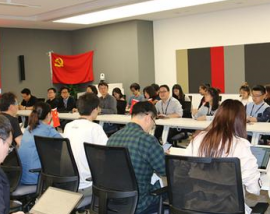In the New York Times today, Raymond Zhong and Paul Mozur write about how China risks spoiling its innovative technology sector through increasingly heavy-handed intervention. While China has in recent years “defied the truism that only free and open societies can innovate,” they write, the country’s “tilt toward strongman rule” under Xi Jinping could put that reputation at risk.
Private technology firms in China are being drawn closer to the Chinese Communist Party across a range of technological development initiatives — from self-driving cars to social credit scoring, from voice and facial recognition to satellite navigation. At the same time, the Party is being introduced more forcefully into technology firms themselves. Zhong and Mozur deal with this latter aspect toward the end of their piece, noting how this is visible at the Shenzhen headquarters of Tencent, China’s largest technology firm:
A chart on the wall shows how many employees are party members (more than 8,000 this year). Another display lists the monthly schedule for employees’ party education. (This month’s offering: training sessions on “New Era, New Thought, New Journey.”)
Tencent’s mascot, a jaunty winking penguin, appears throughout with a hammer and sickle on its chest.
But what does the process of “party education” actually look like? In fact, we had a hint last week from China’s Economic Daily newspaper, which reported on a study session a one of China’s leading start-ups, Beijing Byte Dance Telecommunications Co. Ltd., which was harshly disciplined by authorities last month, its CEO issuing an abject apology.

The Economic Daily reported on April 28 that “the CCP committee of Beijing Byte Dance Telecommunications Co. Ltd. (字节跳动) held a topic course on the conscientious study of the spirit of the National Cyberspace Work Conference (全国网信工作会议).” The work conference mentioned here was the latest forum on cybersecurity, at which President Xi Jinping delivered a speech in which he linked cybersecurity and national security, calling for “improved governance capacity in cyberspace.”
Concerning information controls, Xi said, according to Xinhua News Agency: “Internet media should spread positive information, uphold the correct political direction, and guide public opinion and values towards the right direction.”
The Bytedance study session was chaired by Party secretary and editor-in-chief Zhang Fuping” (张辅评), who according to the Economic Daily shared his own study and explained the link between the spirit of the conference and the company’s own situation.” The meeting was attended both by current Party members and by “those eager to join the Party.” There were reportedly a range of presentations from senior managers, including CEO Zhang Yiming — whose abject and overtly political apology last month was major news — on such topics as “doing a proper job of spreading positive energy” (a Party propaganda phrase) and “enhancing industry self-discipline.” Also on the agenda was the “building of a digital Silk Road” (数字丝绸之路), a tech reference to another of Xi Jinping’s signature policies, the Belt and Road Initiative.
But the chief message was control:
Party secretary and editor-in-chief Zhang Fuping said that the General Secretary had established the bottom line all technology enterprises must follow when he said that “[we] must stay true to the main responsibility of the enterprise, absolutely not allowing the internet to become a platform for the transmission of harmful information and rumors.” As a technology company with a media nature (具有媒体属性), Bytedance must place [correct] guidance and holding of responsibility in the first position, upholding not just its main responsibility but also social reponsibility and moral responsibility.
Control and development have remained in tension in China throughout the four decades of the reform era. Today, in what we might call the post-reform “New Era” of Xi Jinping, control and innovation (the new buzzword for development) are equally if not more in tension.
The Party is gambling its future on the right balance of both.




















